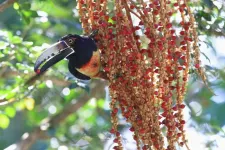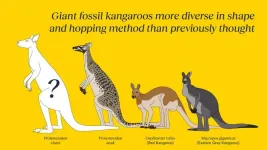(Press-News.org) Important differences in how the nasal cells of young and elderly people respond to the SARS-CoV-2 virus, could explain why children typically experience milder COVID-19 symptoms, finds a new study led by researchers at UCL and the Wellcome Sanger Institute.
The study, published in Nature Microbiology, focused on the early effects of SARS-CoV-2 infection on the cells first targeted by the viruses, the human nasal epithelial cells (NECs).
These cells were donated from healthy participants from Great Ormond Street Hospital (GOSH), University College London Hospital (UCLH) and the Royal Free Hospital, including children (0-11 years), adults (30 – 50 years) and, for the first time, the elderly (over 70 years).
The cells were then cultured using specialised techniques, allowing them to regrow into the different types of cells you originally find in the nose. Using single-cell RNA sequencing techniques that enable scientists to identify the unique genetic networks and functions of thousands of individual cells, the team identified 24 distinct epithelial cell types. Cultures from each age group were then either mock infected or infected with SARS-CoV-2.
The researchers found that, after three days, the NECs of children responded quickly to SARS-CoV-2 by increasing interferon (the body’s first line of anti-viral defence) - restricting viral replication. However, this early anti-viral effect became less pronounced with age.
The researchers also found that NECs from elderly individuals not only produced more infectious virus particles, but also experienced increased cell shedding and damage.
The strong antiviral response in the NECs of children could explain why younger people typically experience milder symptoms. In contrast, the increased damage and higher viral replication found in NECs from elderly individuals could be linked to the greater severity of disease observed in older adults.
Project lead, Dr Claire Smith (Associate Professor at UCL Great Ormond Street Institute of Child Health), said: “Our research reveals how the type of cells we have in our nose changes with age, and how this affects our ability to combat SARS-CoV-2 infection. This could be crucial in developing effective anti-viral treatments tailored to different age groups, especially for the elderly who are at higher risk of severe COVID-19.”
Co-Senior author, Dr Kerstin Meyer (Wellcome Sanger Institute), said: “By carrying out SARS-CoV-2 infections of epithelial cells in vitro and studying the responses with single cell sequencing, we get a much more detailed understanding of the viral infection kinetics and see big differences in the innate immune response between cell types.”
Children infected with SARS-CoV-2 rarely progress to respiratory failure, but the risk of mortality in infected people over the age of 85 remains high, despite vaccination and improving treatment options.
The research underscores the importance of considering age as a critical factor in both research and treatment of infectious diseases.
Co-senior author, Dr Marko Nikolic (UCL Division of Medicine), said: “It is fascinating that when we take away immune cells from nasal samples, and are only left with nasal epithelial cells grown in a dish, we are still able to identify age-specific differences in our body’s response to the SARS-CoV-2 between the young and elderly to explain why children are generally protected from severe COVID-19.”
Dr Smith added: “Understanding the cellular differences at the initiation of infection is just the beginning. We now hope to investigate the long-term implications of these cellular changes and test therapeutic interventions using our unique cell culture model. This ‘gold-standard’ system is only possible with the support of our funders and the willingness of participants to provide their samples.”
The team suggest that future research should consider how ageing impacts the body’s response to other viral infections.
This study was funded by UK Research and Innovation (UKRI), and the National Institute for Health and Care Research (NIHR) Great Ormond Street Hospital Biomedical Research Centre, Wellcome and the Chan Zuckerberg Foundation.
END
Specific nasal cells protect against COVID-19 in children
Peer reviewed | Experimental study | Cells
2024-04-15
ELSE PRESS RELEASES FROM THIS DATE:
Tropical forests can't recover naturally without fruit eating birds
2024-04-15
New research from the Crowther Lab at ETH Zurich illustrates a critical barrier to natural regeneration of tropical forests. Their models – from ground-based data gathered in the Atlantic Forest of Brazil - show that when wild tropical birds move freely across forest landscapes, they can increase the carbon storage of regenerating tropical forests by up to 38 percent.
Birds seed carbon potential
Fruit eating birds such as the Red-Legged Honeycreeper, Palm Tanager, or the Rufous-Bellied Thrush play a vital role in forest ecosystems by consuming, excreting, and ...
Newly sequenced genome reveals coffee’s prehistoric origin story — and its future under climate change
2024-04-15
BUFFALO, N.Y. — The key to growing coffee plants that can better resist climate change in the decades to come may lie in the ancient past.
Researchers co-led by the University at Buffalo have created what they say is the highest quality reference genome to date of the world’s most popular coffee species, Arabica, unearthing secrets about its lineage that span millennia and continents.
Their findings, published today in Nature Genetics, suggest that Coffea arabica developed more than 600,000 years ago in the forests of Ethiopia ...
Human muscle map reveals how we try to fight effects of ageing
2024-04-15
How muscle changes with ageing, and tries to fight its effects, is now better understood at the cellular and molecular level with the first comprehensive atlas of ageing muscles in humans.
Researchers from the Wellcome Sanger Institute and their collaborators at Sun Yat-sen University, China applied single-cell technologies and advanced imaging to analyse human skeletal muscle samples from 17 individuals across the adult lifespan. By comparing the results, they shed new light on the many complex processes underlying age-related muscle changes.
The atlas, published ...
Study shows key role of physical activity and body mass in lung function growth in childhood
2024-04-15
A new study led by the Barcelona Institute for Global Health (ISGlobal), a centre supported by the "la Caixa" Foundation, sheds light on the growth of lung function in children. The results show that increased levels of physical activity and a higher body mass index (BMI) play a key role in the recovery of early deficits. These findings, published in the journal Thorax, have important implications for clinical practice, research and public health policy, providing new insights into how to improve respiratory health from childhood to adulthood.
The study analysed data from the ...
Security vulnerability in browser interface allows computer access via graphics card
2024-04-15
Modern websites place ever greater demands on the computing power of computers. For this reason, web browsers have also had access to the computing capacities of the graphics card (Graphics Processing Unit or GPU) in addition to the CPU of a computer for a number of years. The scripting language JavaScript can utilise the resources of the GPU via programming interfaces such as WebGL and the new WebGPU standard. However, this harbours risks. Using a website with malicious JavaScript, researchers from the Institute of Applied Information Processing and Communications at Graz University of Technology (TU Graz) were able to spy on information about data, keystrokes and encryption ...
Physical activity reduces stress-related brain activity to lower cardiovascular disease risk
2024-04-15
Key Takeaways
Results from a new study indicate that physical activity may help protect against cardiovascular disease in part by reducing stress-related brain activity
This effect in the brain may help to explain why study participants with depression (a stress-related condition) experienced the greatest cardiovascular benefits from physical activity.
BOSTON – New research indicates that physical activity lowers cardiovascular disease risk in part by reducing stress-related signaling in the brain.
In the study, which was led by investigators at Massachusetts General Hospital (MGH), a founding member of the Mass General Brigham healthcare ...
Inaugural International COSPAR Planetary Protection Week: Set to inspire global collaboration in London
2024-04-15
With an increasing number of space missions targeting various celestial bodies, including Mars, Europa, and the Moon, the importance of maintaining the integrity of these environments while protecting our own biosphere has never been greater. The ICPPW will serve as a platform for promoting international collaboration and knowledge exchange on best practice in planetary protection.
The event will feature a range of sessions, meetings, as well as panel discussions, covering key topics such as the current and ...
A quarter of deaths among young adults in Canada were opioid related in 2021
2024-04-15
Premature deaths related to opioids doubled between 2019 and 2021 across Canada, with more than 1 in 4 deaths among young adults aged 20–39 years attributable to opioids, according to new research published in CMAJ (Canadian Medical Association Journal) https://www.cmaj.ca/lookup/doi/10.1503/cmaj.231339.
Opioid-related deaths have continued to increase over the past decade across Canada, with 6222 deaths occurring in 2021. This trend worsened during the COVID-19 pandemic, although the scale and rapidity of increases varied across provinces and territories. ...
Severe morning sickness: how to diagnose and treat
2024-04-15
Severe morning sickness in pregnancy, known medically as hyperemesis gravidarum, can negatively affect both maternal and infant health. A review published in CMAJ (Canadian Medical Association Journal) https://www.cmaj.ca/lookup/doi/10.1503/cmaj.221502 provides information to clinicians on the causes, diagnosis, and treatment of the condition.
Although nausea and vomiting are common in pregnancy, affecting as many as 70% of pregnancies, severe vomiting and nausea can prevent people from eating and drinking sufficiently, leading to weight loss and ...
Digging up new species of Australia and New Guinea’s giant fossil kangaroos
2024-04-15
Palaeontologists from Flinders University have described three unusual new species of giant fossil kangaroo from Australia and New Guinea, finding them more diverse in shape, range and hopping method than previously thought.
The three new species are of the extinct genus Protemnodon, which lived from around 5 million to 40,000 years ago – with one about double the size of the largest red kangaroo living today.
The research follows the discovery of multiple complete fossil kangaroo skeletons from Lake Callabonna in arid South Australia in 2013, 2018 and 2019. These extraordinary fossils allowed lead researcher ...
LAST 30 PRESS RELEASES:
Smithsonian planetary scientists discover recent tectonic activity on the Moon
Government censorship of Chinese chatbots
Incorporating a robotic leg into one’s body image
Brain imaging reveals how wildlife photos open donor wallets
Wiley to expand Advanced Portfolio
Invisible battery parts finally seen with pioneering technique
Tropical forests generate rainfall worth billions, study finds
A yeast enzyme helps human cells overcome mitochondrial defects
Bacteria frozen in ancient underground ice cave found to be resistant against 10 modern antibiotics
Rhododendron-derived drugs now made by bacteria
Admissions for child maltreatment decreased during first phase of COVID-19 pandemic, but ICU admissions increased later
Power in motion: transforming energy harvesting with gyroscopes
Ketamine high NOT related to treatment success for people with alcohol problems, study finds
1 in 6 Medicare beneficiaries depend on telehealth for key medical care
Maps can encourage home radon testing in the right settings
Exploring the link between hearing loss and cognitive decline
Machine learning tool can predict serious transplant complications months earlier
Prevalence of over-the-counter and prescription medication use in the US
US child mental health care need, unmet needs, and difficulty accessing services
Incidental rotator cuff abnormalities on magnetic resonance imaging
Sensing local fibers in pancreatic tumors, cancer cells ‘choose’ to either grow or tolerate treatment
Barriers to mental health care leave many children behind, new data cautions
Cancer and inflammation: immunologic interplay, translational advances, and clinical strategies
Bioactive polyphenolic compounds and in vitro anti-degenerative property-based pharmacological propensities of some promising germplasms of Amaranthus hypochondriacus L.
AI-powered companionship: PolyU interfaculty scholar harnesses music and empathetic speech in robots to combat loneliness
Antarctica sits above Earth’s strongest “gravity hole.” Now we know how it got that way
Haircare products made with botanicals protects strands, adds shine
Enhanced pulmonary nodule detection and classification using artificial intelligence on LIDC-IDRI data
Using NBA, study finds that pay differences among top performers can erode cooperation
Korea University, Stanford University, and IESGA launch Water Sustainability Index to combat ESG greenwashing
[Press-News.org] Specific nasal cells protect against COVID-19 in childrenPeer reviewed | Experimental study | Cells



